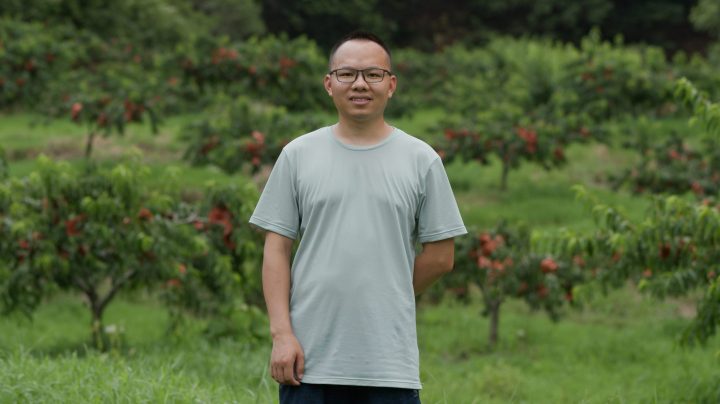
What it takes to lure IT workers back to the Chinese countryside
What it takes to lure IT workers back to the Chinese countryside

On an orange farm in Xinfeng county, Jiangxi province in central China, over 1,000 trees dot the hills next to a pond. Little green fruits hang off the branches. By November, they’ll ripen into golden and juicy navel oranges — a local specialty.
“It’ll be a better harvest this year,” Xinfeng native and fruit supplier Qingan said as he inspected the oranges. “There is more rainfall.”
The work is very different from his previous job as an IT product manager at a video app startup in the city of Shenzhen. He left the city in 2019, after a big project he was working on fell apart.
“I got sick with depression. I took a year off before returning to my hometown,” the 29-year-old said. “The natural scenery in the countryside is soothing. I’m more relaxed here. Whereas, living in the megacities the pace of life is fast.”
For decades, China’s massive labor force has been shifting from the countryside to the cities. This has been key to the country’s economic success. However, when the Chinese economy is struggling like it is now — with high urban unemployment of 5.2% in May and 20.8% for those ages 16 to 24 — China’s government urges people to return to the land. Almost three years of the strict zero-COVID policy has battered the Chinese economy.

While Qingan was rethinking his big city dreams, his roommate and college friend Hu Hang was doing the same. Hu was earning good money as a coder in Shenzhen, but said he had zero social life.
“Every day I just commuted from home to the office and back,” the 32-year-old said.
In October 2019, while Hu was visiting his family in a neighboring county, he received a call from his friend.
“[Qingan] said, ‘How about we return to our hometowns and sell high quality fruit?’ I said yes without a second thought,” Hu said.
Together, they source navel oranges from Xinfeng county and are co-investors in a peach orchard in the village Hu was born in, in nearby Shicheng county. They’ve been selling fruits to wealthier families in big cities since 2020.
“In the first year we made less than 10,000 yuan [$1,400] total,” Hu said, adding that he earned at least double that amount per month in Shenzhen.
But he and Qingan have no regrets going back. Their sales were boosted during the Shanghai lockdown and subsequent COVID wave last year, when demand for vitamin C shot up.

“I want to encourage more entrepreneurial young people to go back to their hometowns,” Hu said. “There is a lot of potential in agriculture.”
Hu and Qingan are heeding the call of China’s government for people to return and revive the countryside.
Still, when the Marketplace team was having lunch in Xinfeng county earlier this month, three people from the local propaganda department made a surprise visit. They heard the Marketplace team were in town and wanted to “assist” them in their interviews. They followed the team to the orange farm.
“It is pretty easy to grow nice oranges. Not hard to pick up the skills,” local orange expert Guo Huashan said as the propaganda department staff watched carefully. He attributes the good fruit quality mostly to the region’s red soil.
However, reviving the countryside is not a simple task.
For instance, a lot of farmers fertilizing the land at the peach orchard are mostly older people. Many homes are abandoned. Locals say the village no longer has an elementary school, making it hard for young families to move back.


“Coming from a megacity, of course it is easy to see our village as idyllic,” peach farmer Luo Changgen said. “But ever since our village was designated a national nature reserve, we can’t develop anything else here. They only let us grow these peach trees. So, there’s not much else we can do to earn money here.”
Most people end up shifting to the more urbanized county seats, where blocks of condos often stretch into the horizon. But opportunities there are also limited.
Over in bustling Shenzhen, real estate agent Eric He said he did try living in his hometown 650 miles away in Hubei province for a few years. While he wasn’t earning as much as in the cities, he also didn’t work as many hours.
“I was definitely much happier in my hometown [than in Shenzhen],” he said.

However, his employer there, property giant Evergrande, got into huge debt and cut his salary.
“I have thought about raising chicken and pigs in the countryside, but let’s be real,” He said. “It is very hard for young people to do such hard work. I mean it is such a smelly job.”
Four months ago he moved to Shenzhen and is renting a small apartment.
Now, he and his wife are expecting a baby. She is still back home while he is alone in the city.
“I’ll work in Shenzhen for a few years. Since I’m still relatively young, I’ll try to earn as much money as I can,” he said.
“Shenzhen is a good city, but if you are an ordinary guy [like me from the countryside] it is really hard to find your place here.”
Additional research by Charles Zhang.
There’s a lot happening in the world. Through it all, Marketplace is here for you.
You rely on Marketplace to break down the world’s events and tell you how it affects you in a fact-based, approachable way. We rely on your financial support to keep making that possible.
Your donation today powers the independent journalism that you rely on. For just $5/month, you can help sustain Marketplace so we can keep reporting on the things that matter to you.











